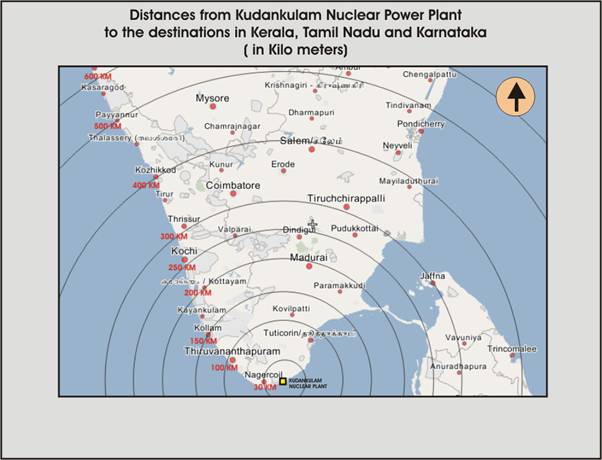People's activists want the Kudankulam nuclear power plant shut down completely; Tamil Nadu's politicians have the less ambitious aim of halting work on the project until the fears of local people are allayed. The plant was originally scheduled to begin operations later this month.
A combination of the Fukushima aftermath and the nature of politics in India have brought this about. The Fukushima angle is not only because Kudankulam is a nuclear power generation facility, but also because of its location by the sea, and the populated peninsular India.
Looking at the map, one might be reminded of the Indonesian earthquake that triggered the tsunami, which reached the coastlines of India and wiped out people and communities.
In a tropical country like India, where it is the sea that guarantees limitless water supply, well, nuclear power plants tend to be located very near the coast: as the Union of Concerned Scientists explains:
So, ... One can easily imagine the complex politics in this context. A country with severe electricity shortage while demand rapidly increases; a facility constructed at quite an expense in a country that has nearly half a billion poor; the location dynamics affected by the consequences of earthquakes and tsunamis; politicians and activists who are only too eager to seek short-term victories; cavalier statements by officials; and endless commentaries (including this one!)
Nuclear power plants are usually built next to lakes, rivers, and oceans.1 Not for the scenic views that such locales provide, but because water can absorb the waste heat produced by the plants. Nuclear power plants consume vast amounts of water during normal operation to absorb the waste heat left over after making electricity and also to cool the equipment and buildings used in generating that electricity. In event of an accident, nuclear power plants need water to remove the decay heat produced by the reactor core and also to cool the equipment and buildings used to provide the core’s heat removal.
So, ... One can easily imagine the complex politics in this context. A country with severe electricity shortage while demand rapidly increases; a facility constructed at quite an expense in a country that has nearly half a billion poor; the location dynamics affected by the consequences of earthquakes and tsunamis; politicians and activists who are only too eager to seek short-term victories; cavalier statements by officials; and endless commentaries (including this one!)
This will, however, not be the final battle over nuclear power.
as for China, India, and South Korea -- countries with a growing appetite for nuclear power that account for the bulk of active plant construction -- only the first has put any of its nuclear plans on pause, and that's just pending a safety review. India and South Korea have vowed to tighten safety standards, but have otherwise forged ahead with plans for nuclear expansion.
There are three reasons why hydrocarbons will continue to dominate the global energy mix for decades to come: cost, the slow pace of energy transitions, and scale.
Further, carbon-based sources are already being contested, as I noted even recently, when I worried about the growing tensions, primarily between India and China, over valuable oil and natural gas in the South China Sea, off Vietnam.
The South China Sea war of words is escalating as well:
India is playing with fire by agreeing to explore for oil with Vietnam in the disputed South China Sea, a major Chinese newspaper said on Sunday, advising the Indian company to reconsider and pull out. ...
The China Energy News, published by Communist Party mouthpiece the People's Daily, said cooperation between India and Vietnam in these seas was a bad idea.
"India's energy strategy is slipping into an extremely dangerous whirlpool," it said in a front page commentary. ...
"Challenging the core interests of a large, rising country for unknown oil at the bottom of the sea will not only lead to a crushing defeat for the Indian oil company, but will most likely seriously harm India's whole energy security and interrupt its economic development.
"Indian oil company policy makers should consider the interests of their own country, and turn around at the soonest opportunity and leave the South China Sea," it said.
I can only imagine that these resource issues will worsen this decade before they can get any better.


1 comment:
Japan, which produced more than 10 percent of global nuclear power before it suffered last year's accident at Fukushima, joins Germany, Switzerland and Belgium in deciding to shut down nuclear plants and to spend money on renewable energy instead.
- from a recent NYT article.. can India deal with a nuclear accident?
Post a Comment